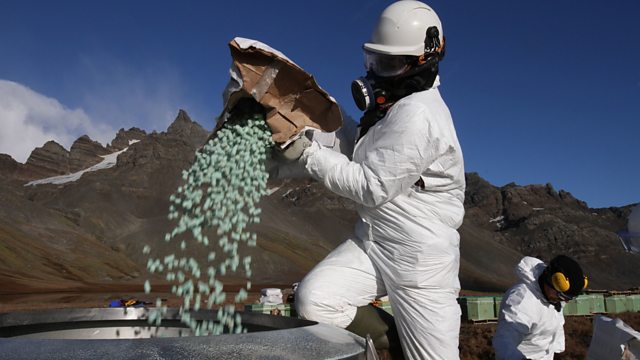
South Georgia Declared Rat-Free
Rat eradication in South Georgia; Amphibian deadly fungus; Health risks of burning waste in Lebanon; Redesigning the smear test; The rise of dinosaurs; Saunas
On the remote island of South Georgia, Antarctica, the invasion of rats from passing ships has wreaked havoc on the local wildlife. But the South Georgia Heritage Trust announced this week that all rats have been eradicated, thanks to an extensive project. Adam Rutherford speaks to chairman Professor Mike Richardson about the achievement and how wildlife is already healing.
Amphibian Deadly Fungus
According to new research a deadly fungus which has infected more than 700 species of amphibians originated from the Korean Peninsula. The data provides a more complete picture of how the fungus spread from region to region, and emphasises that human trade of amphibian species over the past 100 years has accelerated the spread of the disease. Simon O’Hanlon, from Imperial College London’s Department of Infectious Disease Epidemiology, explains more to Roland Pease.
The Health Risks of Burning Waste in Lebanon
Since the closure of a landfill site near Beirut, residents have started to burn rubbish which was building up on the streets. The Mount Lebanon region saw a 500% rise of cases of open burning. Respiratory doctors say the toxic fumes from the fires can put people’s health at risk, as Hugo Goodridge reports.
The Smear Test
The smear test – or pap smear – is carried out to detect any changes in cells which might later on lead to cervical cancer. But for some women the test itself puts them off going – as it can be uncomfortable and embarrassing. In the UK the number of women going for screening is at its lowest rate for 19 years and for 30 in the US. The design of the vaginal speculum used today dates back to the Ancient Greeks – so could it do with a re-design, to make it more patient-friendly? Claudia Hammond talks to Kate Sanger from Jo’s Cervical Cancer Trust and mechanical engineer, Fran Wong, from Frog Design in California.
The Rise of the Dinosaurs
We all know how dinosaurs became extinct, but how did they rise to prominence? Dr Steve Brusatte talks to Adam Rutherford about what the origins of dinosaurs and how they came to dominate the earth.
Time in a Sauna Linked to Lower Stroke Risk
For Finnish people there is nothing more relaxing than sitting inside a hot sauna. And now a new study suggests that taking frequent saunas could reduce the risk of having a stroke. The researchers believe that the intense heat helps to reduce blood pressure, cutting the risk. Claudia Hammond speaks to Dr Setor Kunutsor from the University of Bristol’s Musculoskeletal Research Unit.
(Photo credit: A member of Team Rat filling a baiting bucket in South Georgia – credit: Oliver Prince/PA Wire)
The Science Hour was presented by Claudia Hammond with comments from freelance writer and columnist for ���˿��� Future, David Robson
Producer: Katy Takatsuki
Last on
More episodes
Previous
Broadcast
- Sat 12 May 2018 11:06GMT���˿��� World Service Americas and the Caribbean
Podcast
-
![]()
Unexpected Elements
The news you know, the science you don't

